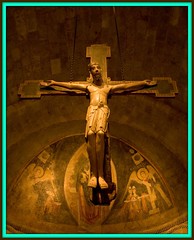I'm still stuck on grace. I like grace; I like to explore the meaning and limits of grace. Are there any limits? I'm not sure, maybe there aren't. God's grace is as deep as God wants or allows it to be. It's not really up to me. He will forgive and heal and save at his discretion, not mine.
Some preachers and teachers of the Word say that there is no end to the grace of God. He will forgive and receive any of us even if we do not repent and change our behavior as long as we claim grace and believe that he died to make us righteous. Jesus said that we should forgive our brother repeatedly even to 70 times 7 times. I think he meant that as an analogy for infinity. I should not try to set limits on forgiveness because God does not. He forgives me over and over.
Paul said that the law was given by Moses to teach mankind the meaning of sin, but where sin was plentiful, the grace of God was even more plentiful. (Romans 5:20 my translation.) Grace trumps sin. So does it matter that we do things God doesn't approve if he is going to forgive anyway? In Romans 5:8 Paul states that when we were still sinners Christ died for us to remove the barrier that separated us from God.
If this is true and grace is poured out for us, even in spite of our sin, we might surmise that the more we sin, the more of God's grace we can claim. No! God forbid it, Paul says in Romans 6:1. When we were saved and brought into the grace of God, we were not saved to continue in sin, but to be released from its grip. Jesus died and we were redeemed and freed from sin to live a holy life before God. We are always moving closer to the life of purity Jesus followed, and the more we walk with him, the closer we come to that perfection.
Does it make sense that we would be saved from the sin that is common in the world, but continue to engage in it? No. It's like a child growing to adulthood. If the boy at 10 is no closer to manhood than he was at 1, something is terribly wrong. The senior in high school who can only do basic addition is not learning his lessons. The person who continues in sin refuses to grow into the Christian Christ died to create.
Yes, we are forgiven over and over, but we are obligated to repent and forsake the sin when we recognize it. It damages our souls, our lives, our relationships to God and to others. The consequences are damaging and damning. John the Baptist, Jesus himself, Paul and preachers over the centuries have pleaded with sinners to repent. It is still a valid message. Repent! Repent and walk in grace.
Some preachers and teachers of the Word say that there is no end to the grace of God. He will forgive and receive any of us even if we do not repent and change our behavior as long as we claim grace and believe that he died to make us righteous. Jesus said that we should forgive our brother repeatedly even to 70 times 7 times. I think he meant that as an analogy for infinity. I should not try to set limits on forgiveness because God does not. He forgives me over and over.
Paul said that the law was given by Moses to teach mankind the meaning of sin, but where sin was plentiful, the grace of God was even more plentiful. (Romans 5:20 my translation.) Grace trumps sin. So does it matter that we do things God doesn't approve if he is going to forgive anyway? In Romans 5:8 Paul states that when we were still sinners Christ died for us to remove the barrier that separated us from God.
If this is true and grace is poured out for us, even in spite of our sin, we might surmise that the more we sin, the more of God's grace we can claim. No! God forbid it, Paul says in Romans 6:1. When we were saved and brought into the grace of God, we were not saved to continue in sin, but to be released from its grip. Jesus died and we were redeemed and freed from sin to live a holy life before God. We are always moving closer to the life of purity Jesus followed, and the more we walk with him, the closer we come to that perfection.
Does it make sense that we would be saved from the sin that is common in the world, but continue to engage in it? No. It's like a child growing to adulthood. If the boy at 10 is no closer to manhood than he was at 1, something is terribly wrong. The senior in high school who can only do basic addition is not learning his lessons. The person who continues in sin refuses to grow into the Christian Christ died to create.
Yes, we are forgiven over and over, but we are obligated to repent and forsake the sin when we recognize it. It damages our souls, our lives, our relationships to God and to others. The consequences are damaging and damning. John the Baptist, Jesus himself, Paul and preachers over the centuries have pleaded with sinners to repent. It is still a valid message. Repent! Repent and walk in grace.





